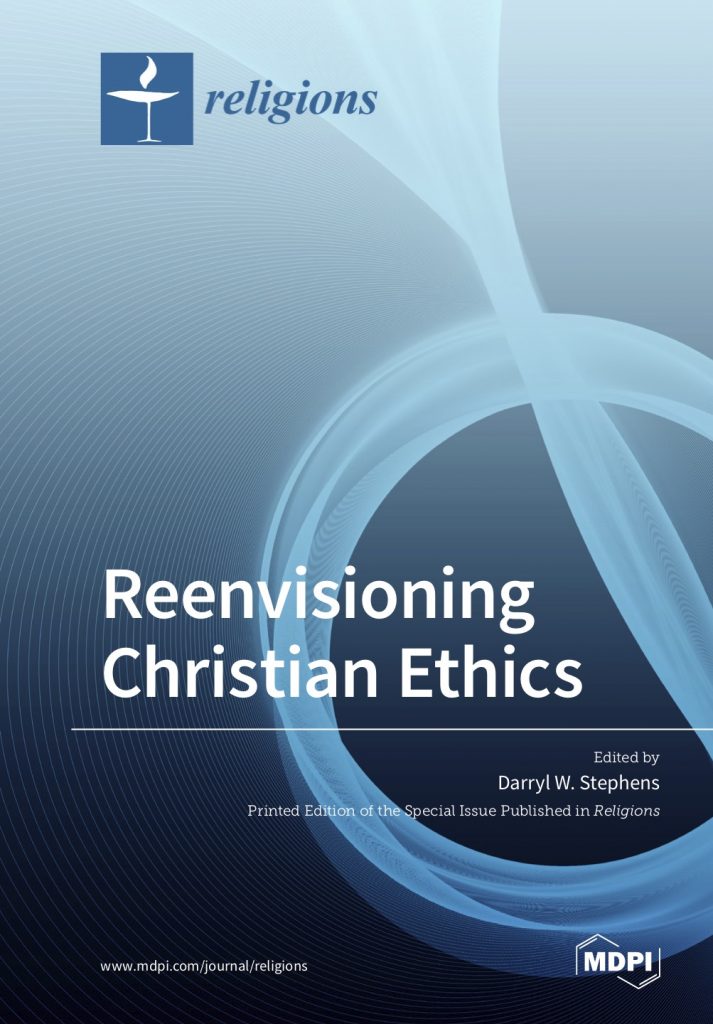
Darryl W. Stephens, ed. Reenvisioning Christian Ethics. Print edition of the special issue published in Religions. Basel: MDPI, 2020.
Featured publication on the American Academy of Religion website, October 2020.
Short notice review by Robin Gill, 2020. Theology 123 (6): 469. DOI: 10.1177/0040571X20970436.
Christian ethics is a wide, varied field. So diverse are the methods and approaches, theological perspectives and starting points, and scopes of inquiry and purposes—dare we even call it a “discipline”?—that the field is rarely considered as a whole. Christian ethics includes historical, descriptive, critical, constructive, and applied projects on countless topics. Lending creative energy to this field of scholarly endeavor are a range of partner disciplines, including, most prominently, theology, philosophy, and sociology—each containing multiple schools themselves. To envision the entire field of Christian ethics is a difficult task; to reenvision the entire field, perhaps impossible for one person. Thus, this publication includes original research by multiple scholars, each offering a distinct perspective from their primary partner discipline. Chapters include Roman Catholic and Protestant voices from Europe, Asia, and North America. In aggregate, these writings contribute to a composite reenvisioning of Christian ethics, refracting our collective vision through the prisms of diverse academic and methodological perspectives in this vast field of inquiry, study, and practice.
OPEN ACCESS scholarship. Available in full text as free download: https://doi.org/10.3390/books978-3-03928-395-8.
Table of Contents
Reenvisioning Christian Ethics: An Introduction and Invitation by Darryl W. Stephens
The task of reenvisioning Christian ethics is real, perspectival, dialogical, collaborative, and purposeful. Correspondingly, the task is awe-filled, discerning, responsive, participatory, and hopeful. Envisioned is a confluence of intersectional, interdisciplinary, and intercultural approaches expanding beyond the academy and even beyond the Christian in order to partner with all members of global society for the common good, shared justice, and full flourishing of all of creation.
READ MORE: https://doi.org/10.3390/rel11020074
Transformational Ethics: The Concept of Obedience in Post-Conciliar Jesuit Thinking by Antje Schnoor. https://doi.org/10.3390/rel10050342
The Scales Integral to Ecology: Hierarchies in Laudato Si’ and Christian Ecological Ethics by Kevin J. O’Brien. https://doi.org/10.3390/rel10090511
Taking Children’s Moral Lives Seriously: Creativity as Ethical Response Offline and Online by Kate Ott. https://doi.org/10.3390/rel10090525
Reconstructing an Ethics of Credit in an Age of Neoliberalism by Ilsup Ahn. https://doi.org/10.3390/rel10080484
Liberating Discernment: Language, Concreteness, and Naming Divine Activity in History by Tyler B. Davis. https://doi.org/10.3390/rel10100562
Challenge of Doing Catholic Ethics in a Pluralistic Context by Shaji George Kochuthara. https://doi.org/10.3390/rel11010017
Pursuing Ethics by Building Bridges beyond the Northern Paradigm by James Francis Keenan. https://doi.org/10.3390/rel10080490
Christian Ethics and Ecologies of Violence by Luke Beck Kreider. https://doi.org/10.3390/rel10090509